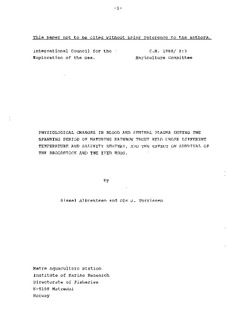Physiological changes in blood and seminal plasma during the spawning period of maturing rainbow trout held under different temperature and salinity regimes, and the effect on survival of the broodstock and the eyed eggs
Working paper
Permanent lenke
http://hdl.handle.net/11250/104462Utgivelsesdato
1988Metadata
Vis full innførselSamlinger
Originalversjon
This report is not to be cited without prior reference to the authorsSammendrag
Maturing rainbow trouts reared in sea cages were transferred to
tanks and kept under nine different temperature and salinity regimes.
Blood and seminal fluids were regularly sampled from the fish,
and different organic and inorganic components were measured. The
survivel of both the broodstock and the eyed eggs were recorded.
Dry matter of the eggs were measured as well.
Sexual differences were noted according to the progressive changes
of glucose, chloride, haematocrit and the survivel of the broodstock.
Cold temperatures delayed the sexual maturation independent
of salinity, and only few females spawned at these temperatures.
The broodstock reared at cold temperatures in freshwater and seawater suffered from high mortality and high levels of blood chloride
or blood glucose. Brackish water appeared to be the most
favourable environment, especially for the broodstock reared at the
warmer temperatures. The survivel of the broodstock and also of
eggs from females stripped at this salinity was high. Analysis of
the physiological components were more stable compared to fish reared
at the other salinities.
